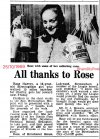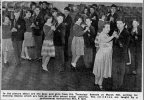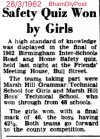Quite a few girls in my year went into teaching. I’ve since wondered if many girls went into traditional male occupations like engineering. I doubt it, that sort of thinking wasn’t generally accepted at the time.
My dad wanted me to go into a scientific occupation so that I could get involved in computers. How perceptive that was. But I didn’t do it as I didn’t like science. My mum wanted me to become an air hostess, didn’t do that either.
A comment on the marsh Hill Boys thread set me thinking about this as at that school boys seem to have been nurtured if they showed a particular interest and ability. I don’t remember this at the girls’ school. I think we may to some extent were still suffering the effects of women only working until they marry and have a family. Viv..
Vivienne, I attended Marsh Hill Boy's Technical Grammar School from 1963-1968.
Regarding your wonderment whether the boys were prepared for technical trades, engineering etc. From my own personal experiences there, not so much. For the most part, our teachers were ex-university types, with few hands-on industrial technical skills, unlike Teacher Technlogy programs widely in effect today.
FWIW, metalwork, woodwork and guilded metalwork were the only non-academic lessons in the boys' school. I found my own way into engineering following in my Dad's footsteps.
There was no support from the school, or footwork to assist us with seeking employment in our desired field. "O" Levels and/or "CSEs" were prerequisites for interviews in technical fields.
There was really no encouragement or support, towards transitioning into the middle class work place of industry and technology.
I did know a couple of girls around that time who attended the girls' school and their experiences pretty much aligned with yours. As you alluded, women were more expected to manage the household and raise the family in those days.
It was pretty much the "old boys' club" trend that continues even today, where breaking into specific roles can still be challenging for females who may be equally or better trained and capable.
Because we were schooled in complete segregation, there were no real opportunities to interact and develop social skills with the opposite sex, that would serve to maximise our potential together.
Martin





